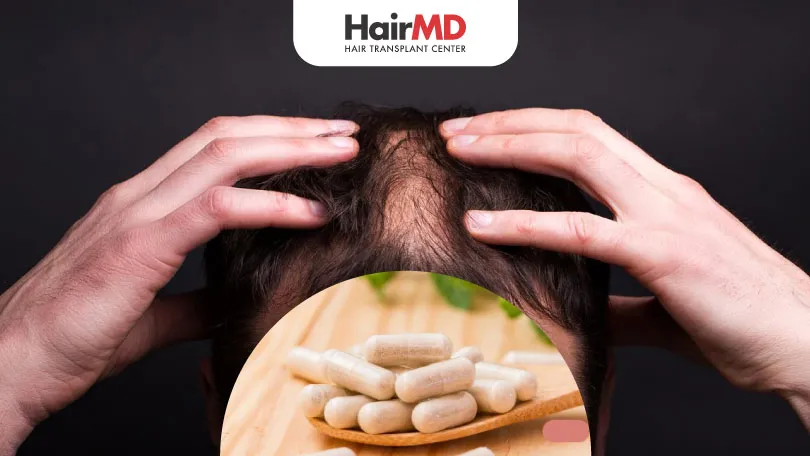12th June, 2022

Explore how isotretinoin, a common acne treatment, may contribute to temporary hair thinning or loss by affecting the hair growth cycle. Learn about potential solutions, expert advice, and tips to manage isotretinoin-induced hair loss effectively.
Isotretinoin is a drug that is often used to treat severe acne. This medication affects the hair cycle, and hence, Isotretinoin and hair loss are connected. Hair thinning is a common side effect that people experience after taking Isotretinoin. Some may experience hair loss as well. But these are temporary, and hair regrows after the medication has been stopped.
What’s covered in the article?
- How Does Isotretinoin Cause Hair Loss?
- Reducing Hair Loss While Using Isotretinoin
- Conclusion
How Does Isotretinoin Cause Hair Loss?
Isotretinoin is a form of vitamin A which suppresses the production of sebum in the skin to reduce acne. However, Isotretinoin affects the body in different ways and can also contribute to hair thinning or hair loss. When sebum is restricted, it affects the hair shaft and follicles, leading to hair loss. The drug prematurely transitions the follicles from the anagen phase (growing phase) to the telogen phase(falling phase). This type of hair loss, or telogen effluvium, is temporary, and hair starts to thicken after the medication has been stopped. But the noticeable changes in the hairline take time. Due to the varying nature of this drug, some people may experience the long-lasting effects of the drug on their hair. If the hair does not grow back in the course of time, then it is important to seek a good hair doctor for consultation. Trichologists who help in treating baldness can help with Isotretinoin related hair loss. Post-diagnosis, an expert trichologist can create a customised treatment plan. They often suggest a good dietary plan along with medication. As isotretinoin is a synthesis of vitamin A, you may be suggested to avoid Vitamin A-rich food till the drug wears off.
Reducing Hair Loss While Using Isotretinoin
Depending on the individual’s reaction, doctors may give you additional medication that combines well with isotretinoin.
- Eat a healthy and nutritious diet that can fulfil the nutrient deficiency in the body.
- Taking a B vitamin complex slows down hair loss associated with alopecia.
- Isotretinoin and hair loss can increase stress levels.
- Try to keep calm, as it helps relax the muscles.
Some general hair care tips can include:
- Keep your hair moist using nourishing oils
- Avoid sulphate-rich hair products as they can make your hair dry
- Avoid blow-drying your hair and let your hair dry at room temperature
- Keep your scalp clean
- Avoid harmful chemicals
Isotretinoin medication does not cause permanent scarring hair loss, and hence the reduction of dosage or stopping the medication as recommended by the hair doctor can help in regenerating the hair growth. Check for any other allergies caused by the medication before starting a treatment.
If you are suffering from isotretinoin-induced hair loss, you may seek experts at HairMD. Our experts will explain to you about Isotretinoin and hair loss and facilitate a customised plan for you to resolve your hair loss problems. The treatment depends on the diagnosis, which will give a detailed understanding of the condition.
Do You Know?
Nearly 250 Patients Visit HairMD
Everyday For Various Hair Concerns?
(Your journey to healthier and fuller hair starts here!)
Meet Our Dermatologists
Conclusion
While isotretinoin can lead to temporary hair thinning in some cases, the effects are often reversible once treatment ends. It’s important to consult with a dermatologist if you experience significant hair loss. By balancing treatment and hair care, most individuals can manage side effects and maintain healthy hair throughout their isotretinoin journey.
Further Reading
Can Rainwater Cause Hair Loss? Understanding the Impact
Find out if Rainwater Cause Hair Loss & how to keep your hair safe during the monsoon season. Expert tips for keeping your hair healthy in rainy weather!
Monsoon Hair Care Tips | Healthy Hair in Every Season
Beat frizz, dandruff, and breakage this monsoon with our monsoon hair care tips. Get advice from a dermatologist in Pune to keep hair healthy all season!
Is Synthetic Hair Transplant Permanent?
Wondering if synthetic hair transplants last forever? Discover how long they last, benefits, risks & more at HairMD, your expert hair clinic in Pune.
Role of Genetics in Hair Loss and Restoration
Discover how genetics influence hair loss and what treatments like FUE, PRP, and GFC can restore hair naturally. Visit HairMD Clinic Pune for expert care.
Have thoughts? Please let us know
We are committed not only to treating you, but also educating you.










